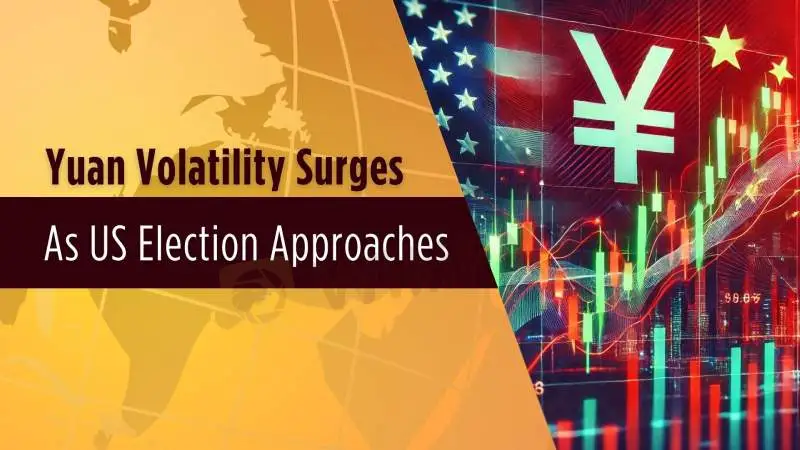简体中文
繁體中文
English
Pусский
日本語
ภาษาไทย
Tiếng Việt
Bahasa Indonesia
Español
हिन्दी
Filippiiniläinen
Français
Deutsch
Português
Türkçe
한국어
العربية
Yuan Volatility Surges as US Election Approaches
Sommario:As US elections near, yuan volatility surges. Traders brace for tariff risks and market swings, preparing for potential economic shifts under Trump or Harris policies.

Yuan volatility is climbing to near-record levels as the US election nears. Traders are preparing for potential economic changes, including possible tariffs on Chinese exports if Donald Trump wins. This heightened volatility highlights the uncertainty surrounding the upcoming election and its likely effects on global currency markets.
US Election Drives Yuan Volatility to Two-Year Highs
Currency traders are closely watching the yuan, expecting sharp fluctuations as the November 5 US Presidential election approaches. The dollar-offshore yuan volatility gauge is now at its highest point since December 2022. The widening gap between one-month and two-week volatility measures suggests traders anticipate significant market swings during the election period.
Financial markets, especially those focused on currencies, are reacting to the tight race between Donald Trump and Kamala Harris. Analysts are examining how each candidate's trade policies might impact the yuan, particularly regarding tariffs on Chinese exports. Historically, tariffs have caused notable declines in the yuan, as seen during Trumps previous term when aggressive tariff policies weakened the currency to a decade-low.
How Trumps Tariff Policies Could Impact the Yuan
One major concern for traders is Trumps potential focus on tariffs. If re-elected, Trump has proposed a baseline levy of 20% on all imports, with tariffs on Chinese goods possibly reaching as high as 60%. This scenario would likely destabilize the yuan, reduce its competitiveness, and lead to capital outflows. A further decline in the yuan could make it harder for China to maintain its trade surplus.
The yuan has already felt the pressure. The onshore currency fell 0.5% to 7.1223 per dollar, marking its weakest level in nearly a month. Exporters are acting cautiously, limiting dollar sales as they brace for a possible Trump victory.

Market Response to Election-Driven Currency Volatility
Financial analysts and forex traders are hedging against yuan volatility. The demand for one-month dollar-yuan options has surged as market participants brace for potential tariff impacts. According to Chris Weston, head of research at Pepperstone Group, “Trumps performance in key swing states has been enough for market players to increase tariff hedges and speculative trades.” This trend is mirrored in other global markets, with volatility rising in currencies such as the Mexican peso and the euro.
With polls still tight, traders are cautious of polling errors that previously underestimated Trumps strength. Peter Branner, chief investment officer at abrdn Plc, noted that a Trump win could lead to higher US yields, inflation, and a stronger dollar—all of which would place further pressure on the yuan.
Global Currency Market Impacts
The impact of the US election on currencies isn‘t limited to the yuan. In global financial hubs, including the United States, China, and the Asia-Pacific region, volatility is increasing. One-month volatility gauges for the euro, Mexican peso, and Taiwan dollar are also rising, reflecting market uncertainty about the election’s outcome and its economic consequences.
This uncertainty is prompting forex traders and financial institutions to carefully manage their portfolios. Analysts recommend that businesses and policymakers stay vigilant and prepare for potential yuan fluctuations as the US election approaches.
Conclusion
Yuan volatility is reaching new heights as the US election draws near, with the possibility of renewed tariffs on Chinese exports looming. Forex traders, investors, and business leaders should closely monitor developments in US election-driven currency volatility. With potential shifts in trade policies under Trump or Harris, global financial markets are preparing for a period of turbulence for the yuan and other major currencies. As the election nears, the yuans performance will offer key insights into broader market trends, and traders should remain alert to these movements.
Stay updated on yuan volatility and market impacts as the US election nears. Explore how tariffs and policies may shape global currency markets on WikiFX news.

Disclaimer:
Le opinioni di questo articolo rappresentano solo le opinioni personali dell’autore e non costituiscono consulenza in materia di investimenti per questa piattaforma. La piattaforma non garantisce l’accuratezza, la completezza e la tempestività delle informazioni relative all’articolo, né è responsabile delle perdite causate dall’uso o dall’affidamento delle informazioni relative all’articolo.
WikiFX Trader
WikiFX Trader
Rate Calc






